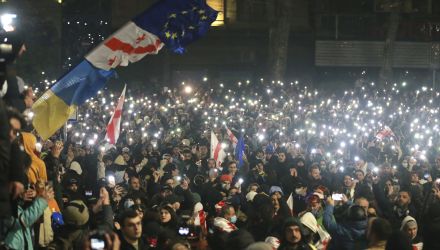Zimbabwe is in deep, seemingly irreversible decay. How to reverse that plunge from prosperity and growth to stagnation and starvation ought to be of paramount concern to African, European and US policymakers. After the immediate crises in Darfur and Cote d'Ivoire, Zimbabwe's impending failure will inflict the most damage on Africa.
The country is suffering from four years of economic decline, with gross domestic product per capita down about 40 per cent from 2000. Banks are failing. Inflation continues at more than 300 per cent. The leadership is wildly corrupt. Hospitals have become morgues, for lack of supplies or physicians. The spread of HIV/Aids is rampant, and life expectancies have fallen from an average 55 years to 35 years. Schools are stymied by severe shortages of teachers and textbooks. Unemployment is about 80 per cent; emigration is essential for many professionals and the exodus to Botswana, South Africa and even Britain is unremitting. Basic foodstuffs and other commodities, especially petrol and diesel, are expensive and scarce.
President Robert Mugabe's government is in a perfect position to use food as a political weapon. Zimbabwe's staple maize supplies are in profound deficit following this year's terrible harvest - in turn caused by the eviction of nearly all commercial farmers from their land and a shortage of capital. In one eastern district, the ruling Zimbabwe African National Union-Patriotic Front (Zanu-PF) party confiscated all the grain in the local stores and now distributes it only to those who purchase party registration cards. That pattern will continue until the parliamentary election scheduled for March.
Only a change of regime, from Mr Mugabe's dictatorship to something much less repressive and more democratic, will permit Zimbabweans to begin reconstructing what was Africa's most balanced, vigorous economy and restore opportunity to what was Africa's strongest and best educated professional class (on a per capita basis). Otherwise, the longer Mr Mugabe - like Alexander Lukashenko in Belarus and the late Mobutu Sese Seko in Zaire - rules, the harder it will become to prevent Zimbabwe from following Liberia, Sierra Leone and Somalia into chaos and squalor.
Last week's open rift between Mr Mugabe and some of his erstwhile associates in malgovernance testified to the president's continued tyranny and an escalating battle over the spoils of despotism. The events of the recent Zanu-PF annual party congress and the controversy over the England cricket team's tour imply no new enlightenment or democratic tendencies within the party or its leadership.
Several years ago, George W. Bush and Tony Blair both tried to chasten Mr Mugabe directly, and also to apply pressure to Thabo Mbeki, president of South Africa and regional king-pin, to bring Mr Mugabe to heel. But in the shadow of Iraq, Washington and London are preoccupied. And so is the United Nations.
Mr Mbeki seems more concerned about further mayhem in Cote d'Ivoire. Nevertheless, he managed for the first time last month to receive Morgan Tsvangirai, leader of Zimbabwe's opposition Movement for Democratic Change. That possibly augurs a relaxation of South Africa's hitherto strong embrace of Mr Mugabe. Mr Mbeki has long claimed an influence over Zimbabwe's leader and conceivably he has relied too much on promises that Mr Mugabe would cease brutalising his own country, particularly the opposition. But except for Mr Tsvangirai's recent acquittal on an old charge of treason (a new one is pending and the acquittal is being appealed), which could only have been accomplished with a nod from Mr Mugabe, there are no signs of change.
Zimbabwe's captive parliament continues to approve legislation preventing the opposition from campaigning, holding meetings, accessing state-controlled media, receiving contributions and even checking voter rolls. Despite a Southern African Development Community directive to the contrary, the March election promises to be as uncompetitive as the 2002 presidential election and the 2000 parliamentary elections, which were likewise rigged.
Short of a successful MDC-led rebellion, which would have the support of urban and many rural Zimbabweans and could lead to massive bloodshed if Mr Mugabe's police and military retaliate, only Mr Mbeki can restore peace and sanity to Zimbabwe. Only he can encourage or compel the 81-year old Mr Mugabe to exit, and save Zimbabwe. Mr Mbeki could provide safe passage to Namibia, where Mr Mugabe has a farm, or offer him safe haven in South Africa. Such an exodus by Mr Mugabe before the March poll would almost certainly lead to an MDC victory and a peaceful transition.
Otherwise, the MDC threatens to boycott the election, giving Mr Mugabe and his cronies another five years in which to continue looting and destruction of their country. That would be tragic for all Zimbabweans. It would also weaken all of southern Africa and damage the credibility of the new African Union and Mr Mbeki's much hyped New Partnership for Africa's Development. Who needs another failed state in Africa?
Rotberg, Robert. “Only Mbeki Can Restore Sanity to Zimbabwe.” Financial Times, December 7, 2004





